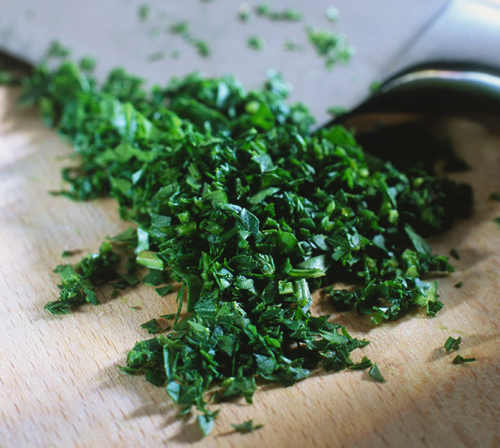|
There is no reason why your baby’s food has to be bland! Adding different types of herbs and spices will help her become accustomed to more sophisticated tastes. The younger she is when you start, the easier it will be for her to make the transition to family food.

| Q: |
Can I add salt or pepper to my baby’s purées to give them more flavor?
| | A: |
Pepper is fine, and you can add some much needed spice to blander
foods. Go easy, though—a little goes a long way with small babies. Try a
few grains to see if he enjoys the taste, and then go from there. Make
sure it’s finely ground, however—coming across a grain of coarsely
chopped black pepper can be eye-watering, and put him off his meal!
Don’t be tempted to
add salt or sugar to your baby’s food, however bland. Salt may harm your
baby’s kidneys and sugar will encourage a sweet tooth. A baby is not
used to these tastes so will not miss them. If you do want to jazz up
his purées, there are plenty of herbs that will do the job (see Did you know…),
or consider adding flavors like garlic or mild curry powder to
vegetable or meat dishes, and cinnamon or vanilla to fruit purées.
|
| Q: |
At what age can my child have sugar?
| | A: |
Most foods contain natural sugars, and provide your child with a
good source of energy. Cane sugar, which is refined and has had all of
its nutrients stripped from it, offers little more than calories, and
can wreak havoc with your little one’s blood sugar levels, leaving her
tired, irritable, and tearful. Unless sugar is required for a particular
recipe—in homemade cakes, pancakes, or muffins, for example, or to
sweeten very tart fruit—I would recommend leaving it off the menu. It’s
much better to choose maple syrup, stevia, or molasses, which offer
vitamins and minerals as well as sweetening, or to choose fruit juices
or purées to sweeten, instead of sugar.
In reality, babies don’t
need additional sugar. They soon become used to the natural sweetness
of fresh, wholesome foods, and develop a taste for them. We may think
their foods are bland, but if that’s what they are used to and all they
know, they’ll be perfectly happy. I would recommend avoiding sugar for
as long as you can—except, of course, on special occasions, when you may
want to offer ice cream or some cake alongside the rest of the family.
|
| Q: |
Fruit and vegetable purées don’t seem very substantial; can I add a little milk or cheese to fill him up?
| | A: |
You can certainly add a little of his regular milk (formula or
breast milk) or a little grated cheese for extra flavor and added
nutrients—see the delicious Cauliflower, potato, and cheese purée
recipe. Remember, though, that first foods are not meant to be full
meals, but rather small tastes to introduce little ones to various
different foods. Your baby doesn’t need to be full after his meals,
since he will likely go on to have his normal milk feed soon after.
|
| Q: |
Are sugarless fruit spreads OK for young babies?
| | A: |
Sugarless fruit spreads are fine for babies, as long as they do
not contain artificial sweeteners. They are, however, very concentrated
and, for that reason, very sweet, so only a little will be required. You
may want to spread them on toast fingers, or to fill tiny sandwiches.
They can also be used in cooking and baking or to sweeten plain oatmeal,
and will provide some extra vitamins and minerals.
|
| Q: |
My baby refuses formula milk; can I flavor it to make it more palatable?
| | A: |
Formula is designed to be a balanced form of nutrition, and
should not, ideally, have anything added to it. Your baby is too young
to give up her regular milk, and you will need to persevere to encourage
her to take formula regularly throughout the day. You can try
incorporating formula milk into the meals you prepare, but it’s unlikely
she’ll get enough to sustain her growth and development.
You may want to try switching formulas to see if another brand has a taste that she finds more acceptable.
If all else
fails, you could consider stirring in a little fruit juice or purée, but
only if your baby is on solids. You must also ensure that you continue
to mix up the formula according to the manufacturer’s instructions. If
your baby continues to refuse the formula, you may need a referral to a
dietitian to provide you with individualized advice.
|
Did you know…
that herbs are a
delicious and nutritious addition to your baby’s food? They can spice
up, or make more fragrant, foods that might otherwise seem a little
flavorless. Any of the green herbs, such as coriander, basil, chives,
and parsley can be added easily, and you can use rosemary and bay leaves
while cooking fish, chicken, or vegetables. The more flavors to which
your little one becomes accustomed while he’s small, the wider the
variety of likes that will be established.

Cauliflower, Potato, and Cheese Purée
This purée is very filling and thick, so ideal for hungry babies. If you are using sweet potato instead of regular white potato, you can reduce the cooking time of the potato on its own to 3 minutes before you add the cauliflower.

10 minutes
13–15 minutes
1 potato or small sweet potato (6oz), peeled and cut into 1/2in cubes 1/4 small head of cauliflower, cut in little florets 1 cup shredded Cheddar cheese 2–4 tbsp breast milk or formula
Put the potato cubes in a
steamer, spreading them out in one layer. Cover and steam for 5
minutes. Add the cauliflower to the steamer, spreading out the florets
evenly. Cover again and steam until the vegetables are soft, 8–10
minutes.
Transfer the vegetables
to a blender and add the cheese and 2 tbsp of the breast milk or
formula. Blend to a smooth purée, adding extra milk or formula if the
purée is too thick.
Freeze in individual
portions. When needed, thaw overnight in the refrigerator, then reheat
until piping hot. Stir and let cool slightly, and check the temperature
before serving.
|